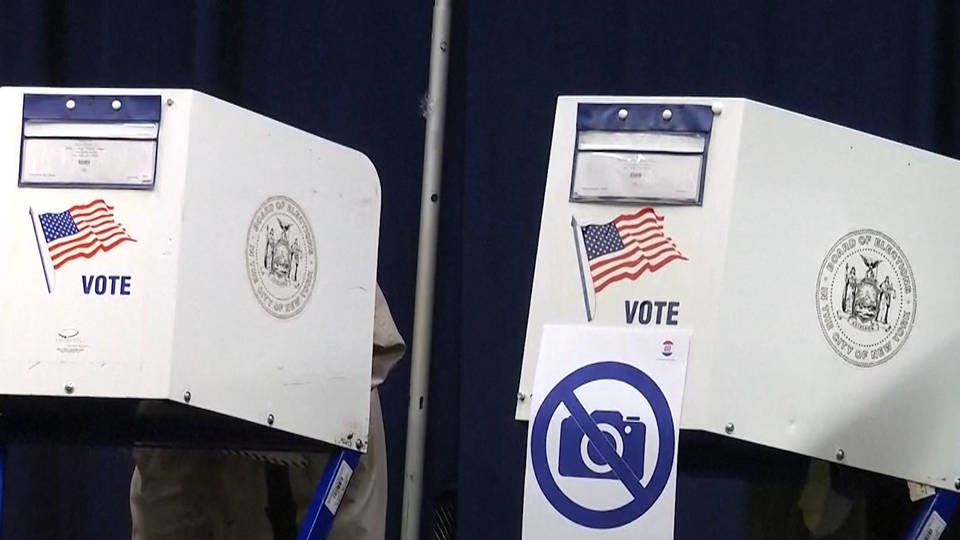Less than two years out from the 2020 US presidential election, the pool of Democratic candidates vying for their party’s nomination is among the largest and most diverse in United Stateshistory.
With 21 candidates already in the race and a number of individuals yet to announce their campaign, the list is likely to grow as the US primary season gets closer.
Here is a look at who has thrown their name in the race so far:
Michael Bennet, 54
Michael Bennet has served as a US senator from Colorado since 2009. Bennet, a former head of the Denver school district, carved out a profile as a wonky, policy-oriented senator.
He gained internet fame this year for a harsh scolding of Republican Senator Ted Cruz of Texas over the government shutdown.
Bennet was close to launching a presidential campaign after that but had to pause it when he was diagnosed with prostate cancer.
 |
| In this file photo taken on April 10, 2019, US Senator Michael Bennet speaks during the North American Building Trades Unions Conference in Washington, DC [Zach Gibson/Getty Images/AFP] |
Bennet’s office said last month that the senator was successfully treated. That cleared the way for his May 2 launch.
Joe Biden, 76
Joe Biden served as vice president under former President Barack Obama from 2009 to 2017 after nearly four decades serving as a senator from Delaware.
Biden is the most experienced politician in the race, and the second oldest, after 77-year-old Bernie Sanders. This will be his third presidential run. His first White House bid in 1987 ended after a plagiarism scandal.
In a video announcement of his candidacy posted on Twitter on April 25, Biden focused on the 2017 deadly clash between white supremacists and counterprotesters in Charlottesville, Virginia. Biden noted US President Donald Trump‘s comments that there were some “very fine people” on both sides of the violent encounter, which left one woman dead.
“We are in the battle for the soul of this nation,” Biden said. “If we give Donald Trump eight years in the White House, he will forever and fundamentally alter the character of this nation – who we are. And I cannot stand by and watch that happen.”
Last month, Biden struggled to respond to comments from Lucy Flores, a 2014 lieutenant governor nominee in Nevada, who said he made her uncomfortable by touching her shoulders and kissing the back of her head before a campaign event. Several other women have made similar claims.
In a video, Biden pledged to be “more mindful” of respecting “personal space”, but Flores told Fox News this week that the former senator’s jokes on the matter have been “so incredibly disrespectful”.
The incident is just a glimpse of the harsh vetting from both Democrats and Republicans expected for Biden, who has run for president twice before but never from such a strong political starting position.
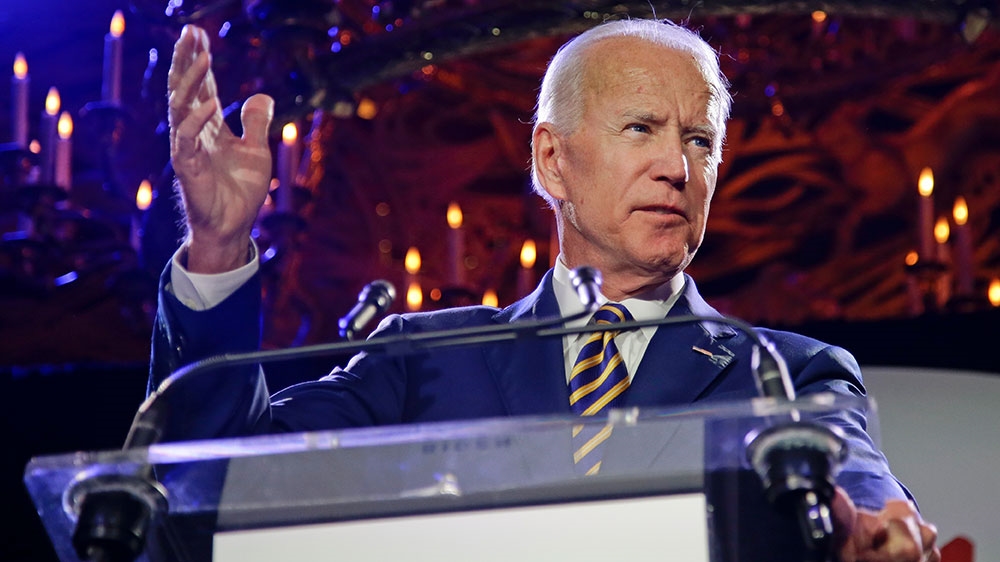 |
| Former Vice President Joe Biden speaks at the Biden Courage Awards last month in New York [Frank Franklin II/AP Photo] |
In recent weeks, he was repeatedly forced to explain his 1991 decision, as Senate Judiciary Committee chairman, to allow Anita Hill to face questions about her allegations of sexual harassment against Clarence Thomas, then a nominee for the Supreme Court.
Biden has since apologised for his role in the hearing. But in the #MeToo era, it is another example of why critics believe he may struggle to catch on with the Democratic primary voters of 2020.
Cory Booker, 49
Cory Booker has served as a US senator from New Jersey – the first African American in the state’s history to hold the office – since 2013. He was the mayor of Newark from 2006 to 2013.
His entry into the Democratic primary was steeped in history and symbolism, befitting his status as the second black candidate in an historically diverse field. Invoking the legacy of the national movements for civil rights and for women’s suffrage, the New Jersey senator during his candidacy announcement urged a return to a “common sense of purpose”.
 |
| Cory Booker speaks to voters during a campaign stop in Manchester, New Hampshire [File: Steven Senne/AP Photo] |
Booker could face difficulty winning the hearts of the progressive Democratic base due to his past financial ties to banking and pharmaceutical interests. He said he would stop taking contributions from pharmaceutical companies in 2017.
He announced his presidential bid on February 1.
Pete Buttigieg, 37
Pete Buttigieg has served as mayor of South Bend, Indiana, since 2012.
Before that, Buttigieg was a consultant for McKinsey and company.
He is the first openly gay Democratic candidate to run for president. He announced his presidential bid on January 23, 2019.
There are no policy positions on his website. He has virtually no paid presence in the states that matter most. And his campaign manager is a high-school friend with no experience in presidential politics.
Despite this, he has suddenly become one of the hottest names in the Democrats’ presidential primary season. On the campaign trail, he has frequently spoken about the struggle to legalise same-sex marriage.
 |
| Pete Buttigieg speaks during the US Conference of Mayors winter meeting in Washington [File: Jose Luis Magana/AP Photo] |
He has also repeatedly criticised Vice President Mike Pence for his view that discredits LGBTQ rights.
“I’m not critical of his faith; I’m critical of bad policies. I don’t have a problem with religion. I’m religious, too. I have a problem with religion being used as a justification to harm people and especially in the LGBTQ community,” the Indiana Democrat said in an interview with NBC’s The Ellen DeGeneres Show this month.
Buttigieg’s moment may pass if he does not take swift action to build a national organisation capable of harnessing the energy, he will need to sustain his surge in the nine months or so before the first votes are cast.
Julian Castro, 44
Julian Castro was elected mayor of San Antonio, Texas in 2009 and served until 2014.
He served as the 16th US secretary of housing and urban development (HUD) under US President Barack Obama from 2014 until 2017.
Castro, the grandson of Mexican immigrants, was raised by a local Latina activist, and after a brief career in law, he was elected mayor of the nation’s seventh-largest city at the age of 34.
 |
| Julian Castro listens as he is introduced at a gathering of Tri-City Young Democrats in Somersworth, New Hampshire, US, on January 15, 2019 [Brian Snyder/Reuters] |
It was not long after that election that Democrats nationally embraced him as a star in the making, particularly one from Texas, where a booming Hispanic population is rapidly changing the state’s demographics and improving the party’s fortunes.
He announced his presidential run on January 12, 2019.
John Delaney, 56
John Delaney served as a US congressman for Maryland’s sixth district from 2013 to 2019.
Delaney, a former banking entrepreneur, is known as politically moderate with a willingness to reach across the aisle.
He has supported a measure to raise money to build infrastructure by allowing US corporations to avoid taxes when they repatriate profits overseas if they buy bonds that would be used to build infrastructure.
 |
| John Delaney stands in a food vendors building during a visit to the Iowa State Fair [File: Charlie Neibergall/AP Photo] |
He announced his presidential run in a Washington Post op-ed published on July 28, 2017.
Delaney, one of the wealthiest members of Congress, was the first to announce he will seek his party’s nomination in 2020.
He said he was entering the presidential race early because he knows he will need time to build name recognition.
Tulsi Gabbard, 38
Tusi Gabbard has served as a US congresswoman from Hawaii’s second district since 2013.
Gabbard is the first Hindu member of Congress. At the age of 21, she became the youngest to be elected to a US state legislature serving on the Hawaii House of Representatives.
She has also served in the Hawaii Army National Guard in a combat zone in Iraq and was deployed to Kuwait.
She was a fierce opponent of same-sex marriage when she served in the state legislature in her 20s. But she has since disavowed those views and professes her support for LGBTQ rights.
Critics have pounced on her efforts to block the legalisation of same-sex marriage in Hawaii and a meeting she held with Syrian President Bashar al-Assad. Earlier this year, she penned an op-ed responding to media reports about her alleged ties to Hindu nationalists.
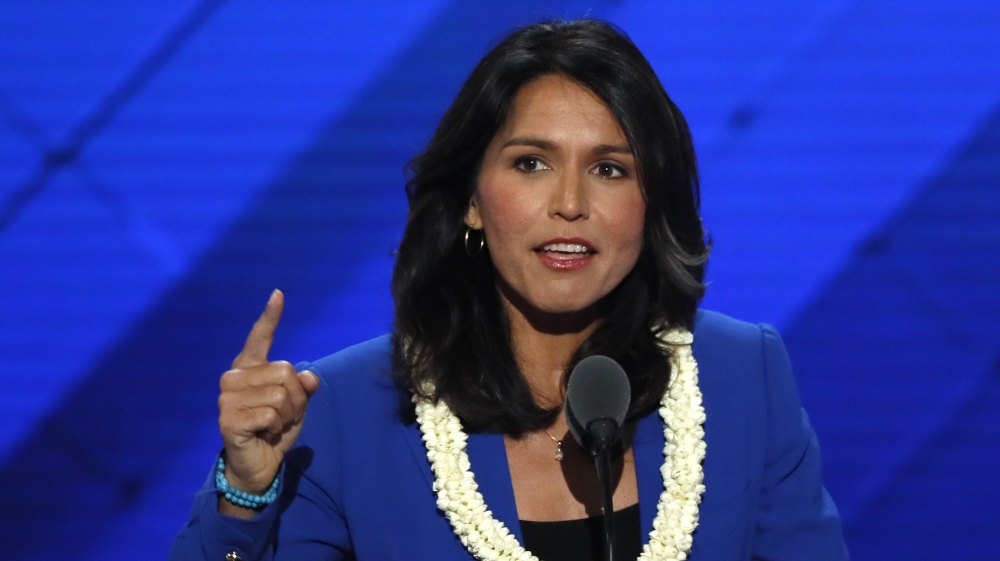 |
| Tulsi Gabbard delivers a nomination speech for Senator Bernie Sanders on the second day at the Democratic National Convention in Philadelphia [File: Mike Segar/Reuters] |
“While the headlines covering my announcement could have celebrated this landmark first, and maybe even informed Americans about the world’s third largest religion, some have instead fomented suspicion, fear and religious bigotry about not only me but also my supporters,” she wrote.
Gabbard officially launched her presidential campaign on February 2, 2019.
Kirsten Gillibrand, 52
Kirsten Gillibrand has served as a US senator from New York since 2009. Before that, Gillibrand served in the House of Representatives from 2007 to 2009.
Gillibrand has also worked for the Department of Housing and Urban Development. She worked on Hillary Clinton’s 2000 US Senate campaign.
She has been a vocal advocate for electing more women to office and a forceful critic of the Trump administration.
 |
| Kristen Gillibrand asks a question during a Senate Armed Services Committee hearing on Capitol Hill in Washington, DC [File: Aaron P Bernstein/Reuters] |
Gillibrand, who has been a forceful public advocate for victims of sexual misconduct, came under fire for how her deputy chief of staff, Anne Bradley, handled a sexual harassment claim made by a female staffer against one of Gillibrand’s male aides.
She announced her presidential run on January 15, 2019.
Kamala Harris, 54
Kamala Harris has served as a US senator from California since 2017.
Before joining the Senate, Harris was the attorney general of California. She has also served as San Francisco district attorney.
Her track record as San Francisco’s district attorney and California’s attorney general has drawn scrutiny in a Democratic Party that has shifted in recent years on criminal justice issues.
Harris is the daughter of immigrants from Jamaica and India.
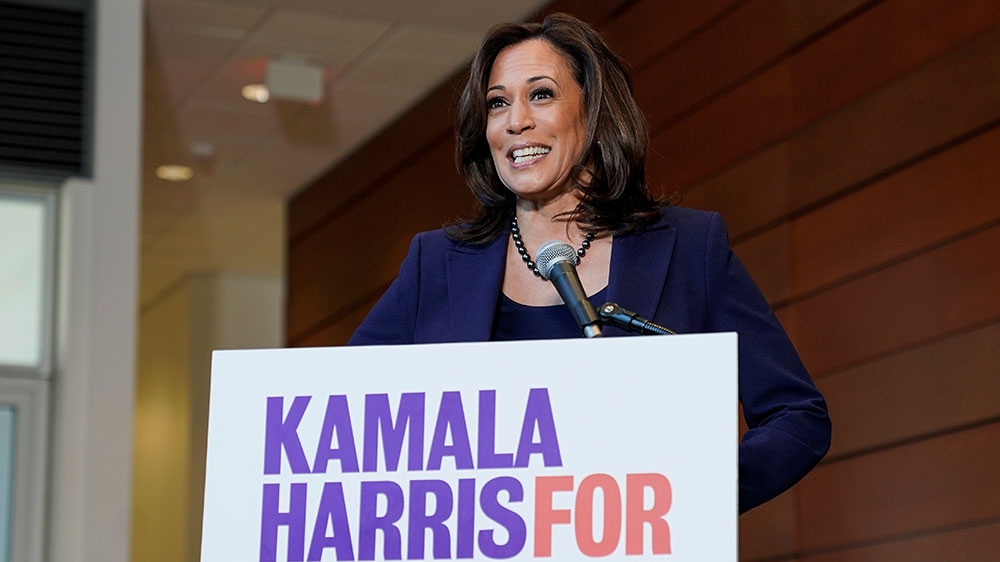 |
| Senator Kamala Harris speaks to the media after announcing she will run for president of the United States [Joshua Roberts/Reuters] |
She supports a middle-class tax credit, Medicare for All healthcare funding reform, the Green New Deal and the legalisation of cannabis.
She launched her presidential run on January 21, 2019.
John Hickenlooper, 67
John Hickenlooper served as the governor of Colorado from 2011 to 2019.
Before that, Hickenlooper served as the mayor of Denver from 2003 to 2011.
Hickenlooper, cofounder of the Wynkoop Brewing Company in Denver, has positioned himself as a centrist and an experienced officeholder with business experience.
 |
| John Hickenlooper speaks at the United States Conference of Mayors winter meeting in Washington, DC [File: Yuri Gripas/Reuters] |
He is the only Democratic presidential candidate so far to oppose the Green New Deal plan to tackle climate change, saying it would give the government too much power in investment decisions.
He announced his presidential run on March 4, 2019.
Jay Inslee, 68
Jay Inslee has served as the governor of the state of Washington since 2013.
He has also served in both the state legislator and US House of Representatives. He was the regional director for the US Department of Health and Human Services under President Bill Clinton.
 |
| Jay Inslee speaks on Friday, March 1, 2019, during a campaign event at A&R Solar in Seattle [Ted S Warren/ AP Photo] |
Inslee, who announced his presidential run on March 1, 2019, has made fighting climate change the central issue of his campaign.
As governor, Inslee has moved to put a moratorium on capital punishment and fully implement the Affordable Care Act, commonly known as Obamacare, accompanying the expansion of Medicaid health coverage for the poor.
Amy Klobuchar, 58
Amy Klobuchar served as a US senator from Minnesota since 2007, becoming her state’s first elected female senator.
Before joining the Senate, she was the Hennepin County lawyer.
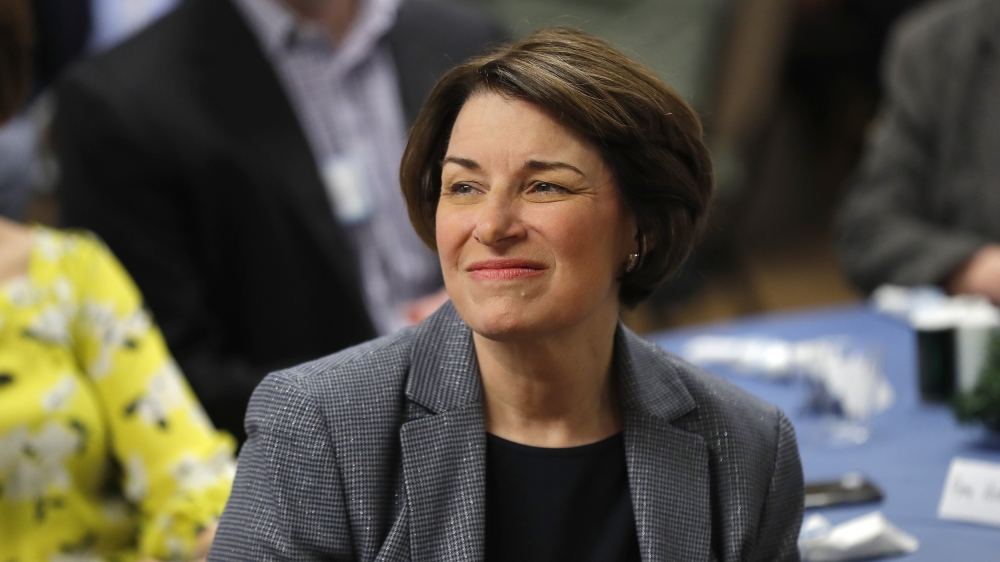 |
| Amy Klobuchar waits to speak at the Ankeny Area Democrats’ Winter Banquet on Thursday, February 21, 2019, in Des Moines, Iowa [Charlie Neibergall/AP Photo] |
Klobuchar gained national attention in 2018 when she sparred with Brett Kavanaugh during Senate hearings for his Supreme Court nomination.
She announced her presidential run on February 10, 2019.
On the campaign trail, the former prosecutor and corporate lawyer supports an alternative to traditional Medicare healthcare funding and is taking a hard stance against rising prescription drug prices.
Wayne Messam, 44
Wayne Messam has served as mayor of Miramar, Florida, since 2015.
Messam grew up in South Bay, an agricultural town of 3,500 people, adjoining Lake Okeechobee. His parents emigrated from Jamaica.
Messam believes Miramar has much that the rest of the US would like to have: environmentally friendly development, high-end manufacturing and major corporate operations.
 |
| Miramar Mayor Wayne Messam poses for a portrait in Miramar [Brynn Anderson/AP Photo] |
Pundits have said he is unlikely to win due to low name recognition and funding. No sitting mayor has ever won the presidency and he has a lack of political experience.
On March 28, 2019, he announced he was running for president.
Seth Moulton, 40
Seth Moulton has served as the US representative for Massachusetts’s sixth congressional district since 2015.
Moulton first came to prominence in 2014 when he unseated long-term incumbent Representative John Tierney in a Democratic primary to represent the sixth congressional district.
Moulton announced his presidential bid on April 22, 2019.
In a YouTube video announcing his presidential candidacy, he said: “Decades of division and corruption have broken our democracy and robbed Americans of their voice.”
 |
| Seth Moulton speaks at a Merrimack County Democrats Summer Social in Bow, New Hampshire [File: Brian Snyder/Reuters] |
In the video, Moulton said he wants to tackle climate change and grow the US economy by promoting green jobs as well as hi-tech and advanced manufacturing.
Moulton served in the Marines from 2001 to 2008. During his 2014 congressional bid, he became a vocal critic of the war in Iraq in which he served, saying no more troops should be deployed to the country.
He has advocated stricter gun laws, saying military-style weapons should not be owned by civilians.
Beto O’Rourke, 46
Beto O’Rourke served Texas’s 16th congressional district in the House of Representatives from 2013 to 2019.
O’Rourke gained fame last year for his record fundraising and ability to draw crowds before of his unexpectedly narrow loss in the US Senate race against Republican incumbent Ted Cruz.
His Senate bid generated a torrent of media attention and excited voters in a party desperate for fresh political faces. He lost the race by fewer than three percentage points, the tightest senate contest in the state in four decades.
O’Rourke announced a $6.1m fundraising haul for the first 24 hours of his campaign, bettering his Democratic opponents.
 |
| Beto O’Rourke speaks during a campaign stop at a cafe on April 19, 2019, in Somersworth, New Hampshire [Scott Eisen/AFP] |
Since his Senate bid ended, O’Rourke has worked to keep himself in the public eye, regularly staying in touch with his supporters and sitting for an interview with Oprah Winfrey.
But with progressive policies and diversity at the forefront of the party’s nominating battle, O’Rourke will face a challenge as a wealthy white man who is more moderate on several key issues than many of his competitors.
He announced his presidential bid on March 14, 2019.
Tim Ryan, 45
Ryan has served as a US House representative from Ohio’s 13th district since 2003.
He represents a northeastern Ohio area that has reportedly lost manufacturing jobs in the past few years and shifted to Republican Donald Trump in the 2016 presidential election.
Ryan has said Trump has turned his back on those blue-collar voters who fled to him in 2016 and failed to live up his promise to revitalise the manufacturing industry.
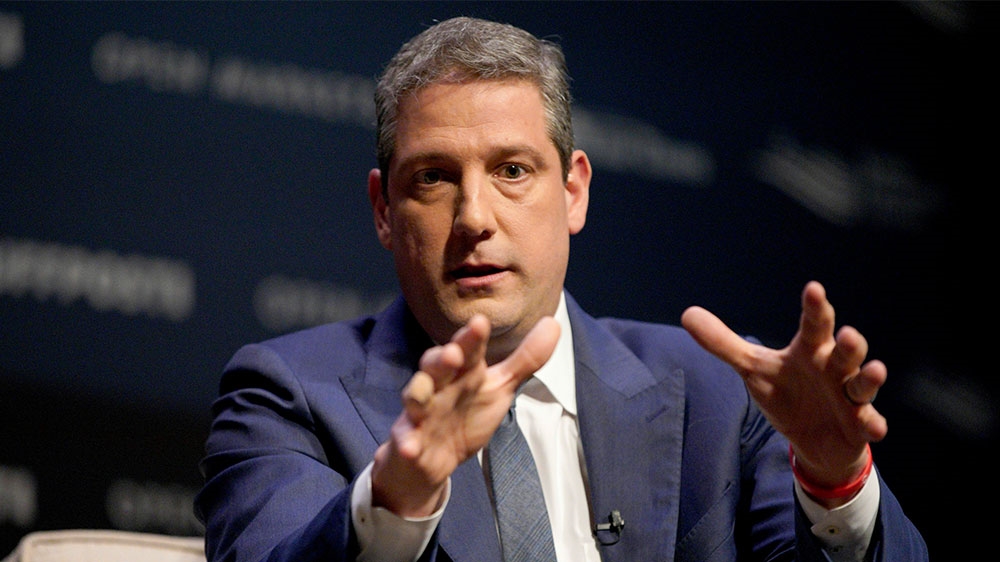 |
| Tim Ryan speaks at the Heartland Forum on the campus of Buena Vista University in Storm Lake, Iowa [File: Nati Harnik/AP Photo] |
Ryan pledged to create jobs in new technologies and to focus on public education and access to affordable healthcare.
He first gained national attention when he unsuccessfully tried to unseat Nancy Pelosi as the House Democratic leader in 2016, arguing it was time for new leadership.
Ryan announced his presidential run on April 4, 2019.
Bernie Sanders, 77
Bernie Sanders served as a US representative for 16 years before being elected to the Senate in 2006 where he currently represents the state of Vermont.
A progressive and cofounder of the Congressional Progressive Caucus, he is the longest-serving Independent in the history of Congress.
Sanders announced his presidential run on February 19, 2019. Sanders ran an unsuccessful bid for president in 2016 after losing to Hillary Clinton.
In the 2020 race, Sanders will have to fight to stand out in a packed field of progressives touting issues he brought into the Democratic Party mainstream four years ago.
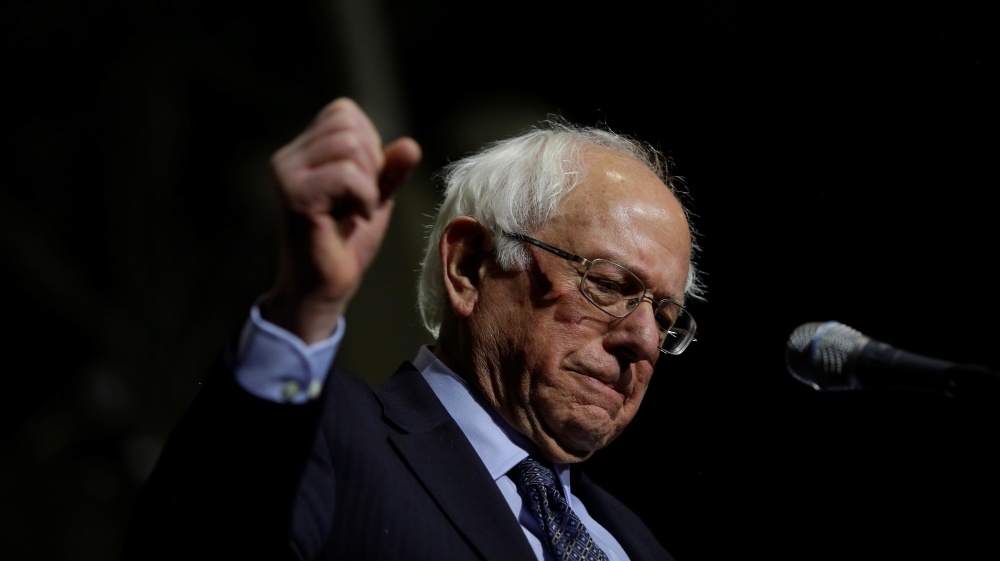 |
| Bernie Sanders speaks as he holds one of his first campaign events in Chicago, Illinois, on March 3, 2019 [Joshua Lott/Reuters] |
His proposals include free tuition at public colleges, a $15 minimum hourly wage and universal healthcare.
He benefits from strong name recognition and a robust network of small-dollar donors, helping him to raise $5.9m during his first day in the contest.
Eric Swalwell, 38
Eric Swalwell, an Iowa native, has served as a House representative from California’s 15th congressional district since 2013.
Since joining congress, Swalwell has advocated for raising the cap on the portion of salary that is subject to the Social Security payroll tax.
He has also proposed a “mobile congress” that would allow politicians to cast votes remotely from their districts.
 |
| Eric Swalwell speaks during a joint hearing of the House Committee on the Judiciary and House Committee on Oversight and Government Reform [File: Jacquelyn Martin/AP Photo] |
Swalwell announced his presidential bid on April 8, 2019.
He said tackling student debt and gun violence were among the reasons he jumped into the Democratic primary race.
Elizabeth Warren, 69
Elizabeth Warren has served as a US senator from Massachusetts since 2013.
Warren, known as a progressive, taught law in a number of universities and was a Harvard professor.
Warren is a leader of the party’s liberals and a fierce Wall Street critic who was instrumental in creating the Consumer Financial Protection Bureau.
Earlier this year, she apologised to the Cherokee Nation for taking a DNA test to prove her claims to Native American ancestry, an assertion that has prompted Trump to mockingly refer to her as “Pocahontas”.
 |
| Elizabeth Warren addresses the Rev Al Sharpton’s National Action Network during a post-midterm election at the Russell Senate Office Building on Capitol Hill [File: Chip Somodevilla/Getty Images/AFP] |
She announced her presidential run on February 9, 2019. She has promised to fight what she calls a rigged economic system that favours the wealthy.
She recently unveiled a student loan forgiveness proposal that would cancel up to $50,000 of debt for millions of Americans. She also supports free college tuition for students at two and four-year institutions.
Marianne Williamson, 66
Marianne Williamson is an author, entrepreneur and activist. Williamson is the founder of Project Angel Food, a volunteer food delivery programme serving home-bound people with life-changing illnesses.
She is also cofounder of the Peace Alliance, an education and advocacy organisation.
The Texas native believes her spirituality-focused campaign can heal the US.
 |
| Marianne Williamson meets with child care advocates at the Nevada State Legislature in Carson City, Nevada [Bob Strong/Reuters] |
A 1992 interview on Oprah Winfrey’s show propelled her to make a name for herself as a “spiritual guide” for Hollywood and a self-help expert.
She is calling for $100bn in reparations for slavery over 10 years, gun control, education reform and equal rights for lesbian and gay communities. In 2014, she made an unsuccessful bid for a House seat in California as an independent.
She announced her presidential run on January 29, 2019.
Andrew Yang, 44
Andrew Yang is the founder of Venture for America. In 2012, the Obama administration selected him as a Champion of Change.
In 2015, he was selected as Presidential Ambassador of Global Entrepreneurship.
He filed with the Federal Election Commission to run for president in 2020 on November 6, 2017.
The entrepreneur and former tech executive is focusing his campaign on an ambitious universal income plan.
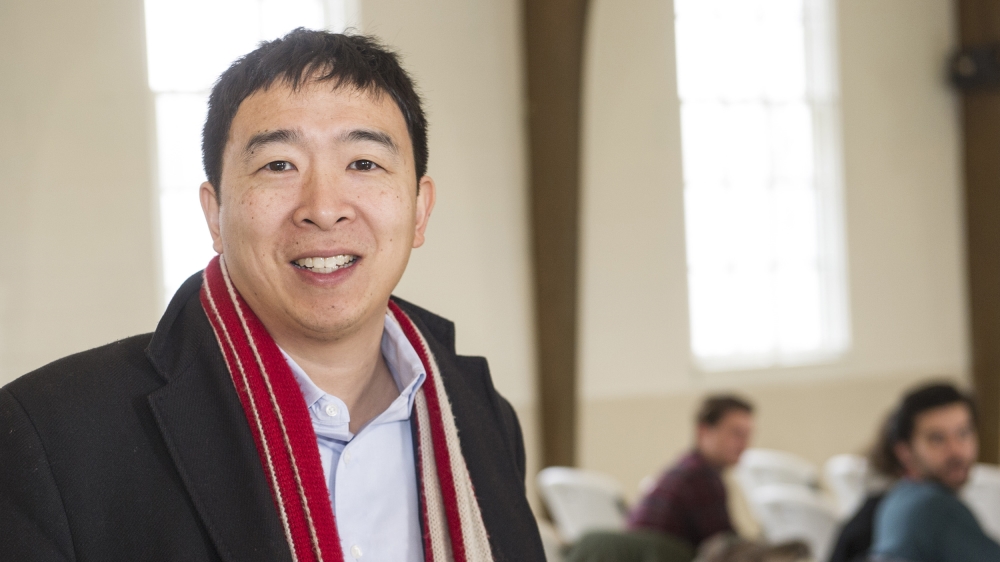 |
| Andrew Yang arrives at a town hall meeting in Cleveland on Sunday, February 24, 2019 [Phil Long/AP Photo] |
Yang wants to guarantee all American citizens between the ages of 18 and 64 a $1,000 cheque every month.
The son of immigrants from Taiwan, Yang also is pushing for Medicare for All and proposing a new form of capitalism that is “human-centred”.





 On November 8, the American people spoke clearly, and chose Hillary Clinton for President. She won the popular vote by 2.9 million votes.
On November 8, the American people spoke clearly, and chose Hillary Clinton for President. She won the popular vote by 2.9 million votes.

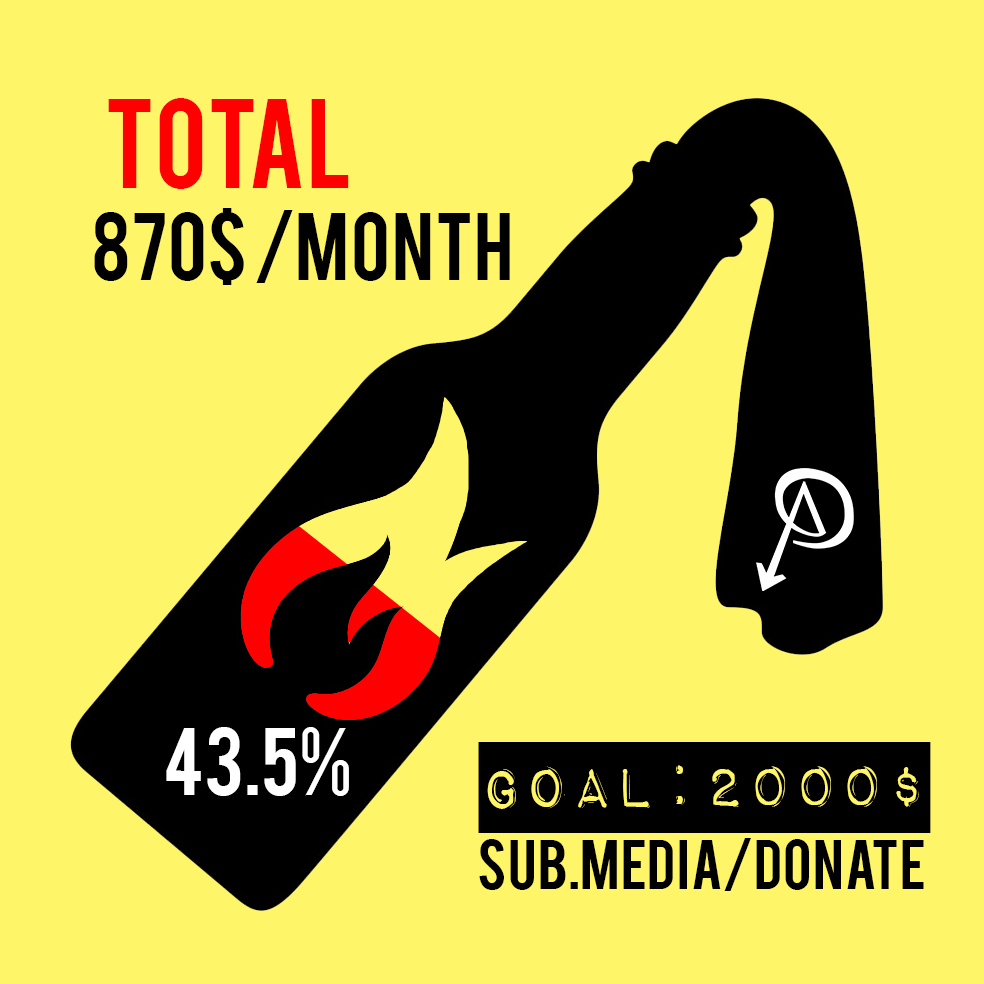
![Who are the 2020 US Democratic presidential candidates? 2020 Democratic presidential candidates are seen in a combination of file photos [Files/Reuters/AFP]](https://www.aljazeera.com/mritems/imagecache/mbdxxlarge/mritems/Images/2019/5/2/2d4b509c43614b3ba20837d9b9618139_18.jpg)





















